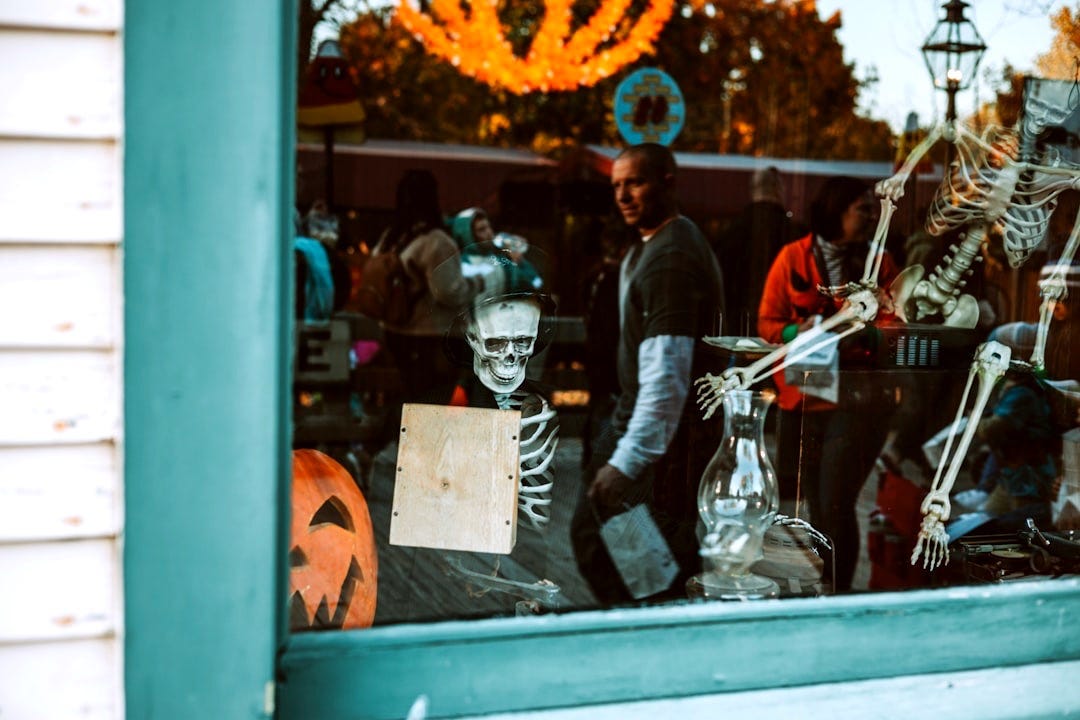Autumn’s Lessons on Mortality—Why Facing Death Helps Us Live More Fully
And avoiding the end leaves us stuck in the middle
Welcome to Am I Cured Yet? I’m so happy you’re here—my sincere thanks for hanging out in my little corner of the internet.
Today, I’m writing about Autumn and why it makes me think about death. This post is part of a series, Where Death Meets Life, in which I explore how confronting mortality can inspire us to live more fully.

It’s Autumn in Los Angeles, and the weather’s finally cooled down.
I admit I’m one of those insufferable people who love this time of year, thrilled to dig out my old, pilled cardigans, spend too much money on chai lattes, rewatch Gilmore Girls, and walk the dogs without breaking a sweat.
Autumn is full of things I adore: kaleidoscopic leaves crunching beneath my feet, the cardamom aroma from a candle on my coffee table, and the infectious buzz of kids on Halloween. But there’s something about this time of year—the bare trees, the cool winds, the longer nights—that always reminds me of a truth we’d rather avoid: we’re all going to die.
Halloween, scary movies, and the Day of the Dead—these darker traditions are all part of the season. In LA in particular, people take great pleasure in decorating their houses for the festivities. And I wonder if the American love for Halloween isn’t born out of the very human fear of death—an indirect acknowledgement of our limited time on Earth without ever saying it out loud?
When I was diagnosed with aggressive breast cancer at 29, I thought about death a lot. Then, when my childhood best friend, Emily, died from breast cancer while I was working through a brutal chemo regimen, I thought about it even more.
I obsessed over death—more than was probably healthy. I wondered what dying would feel like, if it would hurt, if there was an afterlife, or if nothingness was all that awaited.
I didn’t want to die. Not at all.
And yet, there was a certain freedom in facing it. Admitting that, no matter the outcome of my treatment, death is eventually inevitable. It’s a given, I know—that we’re all going to die. But how many of us actually believe it? How many of us live as though tomorrow is promised?
I once read about a Buddhist practice where temples display framed photos of decomposing corpses—an unsettling yet potent reminder of life’s impermanence. Though that may be too macabre for most of us, I believe there’s something to be gained from confronting our mortality. I want to leave this world with as few regrets as possible. And for me, that means accepting my time here is finite.
We all know we’re going to die. But are we living like it’s true? Are we really at peace with that inevitability? I’d love to hear your thoughts.
For me, confronting my mortality means not settling for things that make me unhappy—whether it’s a job, a friendship, or my own insecurities. Death is my reminder that though my time is finite, my choices are infinite.
I believe there’s always room to grow in this life, and I won’t let anything hold me back—except death itself.
Does Autumn bring similar reflections for you? I’d love to hear about them! And if this is your first time here, I’d be honored if you considered subscribing. You can expect always thoughtful, occasionally funny, weekly essays about health, happiness and mortality.
I’ll be back next week—with more to share. Until then, thank you for reading, and take good care of yourself :)
Emma
xx





Well I am SO very glad I stumbled upon your Substack through a simple conversation about a cup of tea. What an incredible outlook you have on life and the fragility of it after the unthinkable hardships you have faced. I will certainly be scouring your previous posts and subscribing! Beautiful, inspiring writing 🙌🏻
I never actually thought of autumn that way but I can totally see it. I do, however, find myself sort of obsessing over death as I age and begin to lose those around me or those I know. So now I'm more reflective and introspective and I'm trying to be more intentional on how I want to spend these (remaining) finite years.